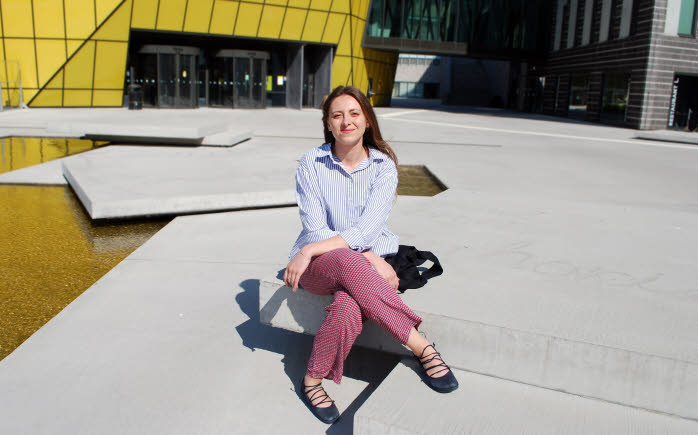“Being at Linnaeus University has been a great experience!”
Postat den 5th July, 2023, 09:17 av Helena Rydén
INTERVIEW | When the Italian doctoral student Elena Maria Cautis had the opportunity to spend time at a foreign institution, her eyes fell on Linnaeus University. Or more precisely: The Centre for Applied Heritage and the UNESCO Chair on Heritage Futures. This was exactly in line with her own research on cultural heritage.
In the spring of 2023, she left the University of Ferrara, where she normally works, and moved to Kalmar to spend three months of exploring heritage research. In addition, she discovered birdwatching and floorball.
What do you think of your time at Linnaeus University?
– Being at Linnaeus University has been a great experience! Besides the importance for my research, it also was a period of reflection for what kind of professional environment I would like to be part of in the future. Everyone was very friendly and attentive to my needs. The facilities at the campus were great, since I was able to work both from the office and the library, which holds relevant works for my research. I’ve also experienced playing “innebandy” (floorball) with colleagues, which was super fun!
– Overall, I think that when I will be looking back years from now, I will identify this period as a turning point for me. As a person and as a professional.
What made you decide for Linnaeus University?
– Within my PhD programme, we are encouraged to spend time at a foreign institution. Given this, I had been looking for some time at the Centre for Applied Heritage at Linnaeus University and at Anders Högberg’s and Cornelius Holtorf ’s work related to heritage futures. After some Zoom meetings with them, I understood that this environment would be a great opportunity for me to explore more in depth the idea of heritage as resource.
– The key components that transpired in the various research projects taking place, were enthusiasm and curiosity towards looking at heritage differently. This is precisely the kind of environment I wanted to be in at that stage of my research, since I was feeling a bit stuck and unmotivated. The main motivation for coming to Linnaeus was a perceived feeling of freedom of thought and enthusiasm for exploring what some might consider ”crazy ideas”. I think this is what innovative thinking is all about!
What did you do during your 3 months here?
What I mainly wanted to do was to meet with people and discuss some of the themes of my research. I had the opportunity to do this, within seminars and workshops. I was also able to get a glimpse at futures literacy within workshops by the UNESCO Chair. Aside from these activities, the most important was being in a continuous dialogue with Anders and Cornelius. They offered me all the assistance and motivation that I needed in my research.
What did you think about living in Sweden?
– This was my first time in Sweden, and was nice to see that people are open, friendly and really keen to support you. Kalmar was just lovely, although at the beginning I had a bit of a weather shock! Being there was a great opportunity to also get more in touch with nature. And after countless walks I decided I am forever hooked with birdwatching! The most important though, was that I felt secure. Although I only had a glimpse at how the Swedish society is, and that there might be issues here and there, the glimpse was that it’s a society where you can flourish.
What do you want to do after you have finished your PhD?
– I would like to continue doing research, while also offering consultancy for heritage projects and international bodies in the field. I am not sure exactly where. But I am sure that I would like to work in an environment similar to the one that at Linnaeus University.


Elena Maria Cautis at Linnaeus University in Kalmar
Det här inlägget postades den July 5th, 2023, 09:17 och fylls under blogg
